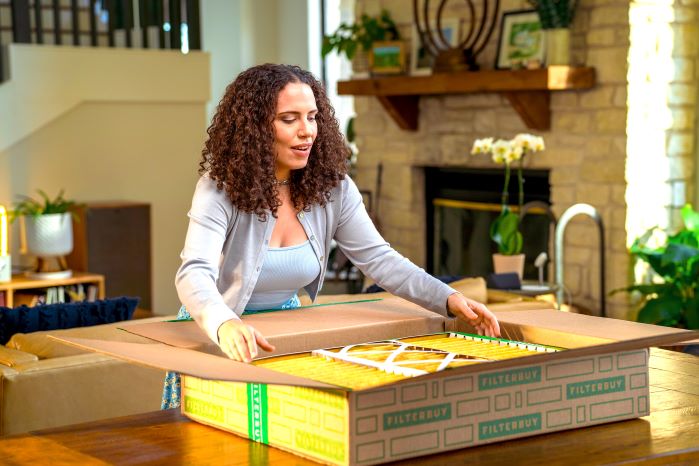Upgrade Your Air Quality with Bryant Filters & UV Light Technology
If you've ever noticed dust buildup, persistent allergies, or musty odors, your HVAC system could be recirculating unfiltered pollutants and airborne bacteria. Based on my experience working with homeowners, I’ve seen how standard filters often fail to capture microscopic contaminants, allowing allergens and pathogens to thrive indoors.
By combining high-efficiency Bryant air filters with UV light technology, you’re not just improving air quality—you’re creating a proactive defense against allergens, mold, and airborne germs. This guide breaks down how advanced filtration and germicidal UV-C lighting work together to deliver cleaner air, longer HVAC lifespan, and fewer health risks—a must-have for any home prioritizing wellness and energy efficiency.
Top Takeaways
Upgrade Your Filter – Use a MERV 13+ Bryant air filter for cleaner air and longer HVAC life.
Add UV Protection – UVGI technology kills bacteria, viruses, and mold.
Maintain Regularly – Replace filters every 3 months and service UV systems annually.
Save Energy – Clean filters reduce HVAC strain and lower energy costs.
Take Action Now – Assess your air quality and install the right filtration for a healthier home.
Case Study: Transforming Indoor Air Quality with Bryant Air Filters & UV Light
The Challenge
A homeowner in Phoenix, AZ, faced:
Persistent allergy issues for the whole family.
Excessive dust buildup, requiring frequent cleaning.
Rising energy bills from an overworked HVAC system.
My Insight
Standard air filters only capture particles, not bacteria or mold.
Microbial growth in ductwork worsens indoor air quality.
A dual approach—filtration + UV sterilization—delivers real results.
The Solution
I recommended:
Bryant MERV 13 Air Filters – Captured 90%+ of allergens like dust, pollen, and pet dander.
HVAC UV Light Installation – Killed bacteria and mold inside the system.
The Results (After 6 Weeks)
Key Insights
Filtration alone isn’t enough. A combination of high-efficiency filters and UV light provides cleaner air, protects your HVAC system, and improves long-term indoor air quality.

"Optimizing indoor air quality isn't just about filtration—it’s about a multi-layered defense. High-efficiency Bryant air filters trap fine particles that standard filters miss, while UVGI technology actively destroys airborne pathogens at the source. In my experience, homeowners who combine these solutions report noticeably fresher air, fewer allergy flare-ups, and reduced HVAC strain. It's a long-term investment in both health and system longevity."
Supporting Statistics: Why Bryant Air Filters & UV Light Matter
Upgrading your HVAC system with Bryant filters and UV light technology significantly improves indoor air quality. Here’s what the data—and real-world experience—show:
- MERV 13+ Filters Capture 95% of Harmful Particles
Standard filters miss fine pollutants like smoke, bacteria, and allergens.
EPA research confirms MERV 13–16 filters remove up to 95% of airborne particles.
Homeowners who upgraded to MERV 13 saw less dust buildup and fewer allergy symptoms.
- UVGI Systems Kill Mold & Airborne Pathogens
Unlike filters, UV light destroys bacteria, viruses, and mold.
EPA studies show Ultraviolet Germicidal Irradiation (UVGI) neutralizes airborne contaminants.
A homeowner struggling with musty odors and allergies saw noticeable improvements within weeks after installing a UV system.
- Better Filtration = Healthier Indoor Air
EPA highlights MERV 13 filters as essential for removing fine particle pollution, including wildfire smoke.
Clients in high-pollution areas reported cleaner air and fewer respiratory issues after switching to higher-grade filters.
Key Thoughts
A dual approach works best—Bryant air filters trap particles, and UVGI systems eliminate airborne pathogens. This combination improves air quality and extends your HVAC system’s lifespan.
Final Thoughts & Expert Opinion
Upgrading air filtration and UV purification isn’t just about cleaner air—it’s about health, efficiency, and HVAC longevity.
Key Benefits:
Bryant air filters trap pollutants that standard filters miss.
UVGI systems eliminate bacteria, viruses, and mold.
Combined solutions reduce allergens, prevent HVAC buildup, and extend system lifespan.
First-Hand Insights:
Homeowners notice fewer allergies, less dust, and fresher air after upgrading filtration.
Adding UV purification enhances results, especially in humid or mold-prone environments.
Bottom Line:
Cleaner air isn’t a luxury—it’s a necessity. For the best results, pair high-MERV filters with UV purification.
Next Steps: Improve Your Air Quality
- Check Your Current Filter
Look at the MERV rating.
Upgrade if below MERV 13.
- Choose the Right Filter
Match it to your home’s needs (allergies, pets, air quality).
Ensure HVAC compatibility.
- Install a UVGI System
Research UV light options for air purification.
Hire a professional for installation.
- Maintain & Replace Regularly
Change air filters every 3 months.
Clean and service UV systems yearly.
- Monitor Improvements
Track dust levels, allergies, and energy efficiency.
Adjust filtration or UV settings as needed.
Start today for cleaner air and a healthier home!
Frequently Asked Questions
How often should you change your HVAC air filter?
The frequency for changing your HVAC air filter typically ranges from every 30 days for cheaper fiberglass filters to every 3-6 months for higher-end pleated filters, depending on factors like filter type, air quality, and household conditions.
Do more expensive air filters work better?
More expensive air filters often have higher MERV ratings, which means they can capture smaller particles and improve air quality, but the best choice depends on your specific needs and system compatibility.
How do I know if my air filter needs cleaning?
You can tell if your air filter needs cleaning by checking for visible dirt or dust accumulation, reduced airflow, or an increase in allergy symptoms or dust within your home.
What happens if you don't change air filter HVAC?
If you don't change your HVAC air filter, it can become clogged, reducing system efficiency, increasing energy bills, leading to poor air quality, and potentially damaging the HVAC system.
Is there really a difference in HVAC air filters?
Yes, there is a difference in HVAC air filters; they vary in material, efficiency, and the size of particles they can capture, as indicated by their MERV rating.
Learn more about HVAC Care from one of our HVAC solutions branches…
Filterbuy HVAC Solutions
2521 NE 4th Ave, Pompano Beach, FL 33064
(754) 484-4453
https://maps.app.goo.gl/JmWkEXya7uzuLzBh8